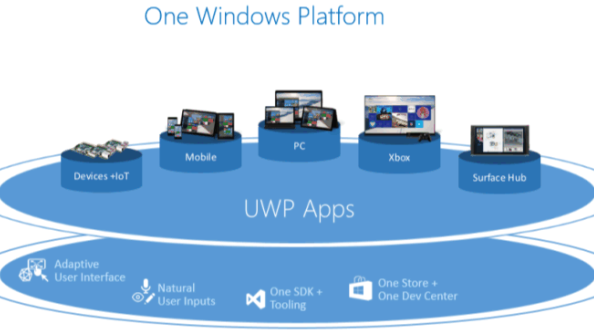One of the first things you do as a PC gamer is train your brain to gently drift away during Microsoft statements on the future of Windows – watching Phil Spencer’s lips move meaninglessly as the volume drops off, replaced by the strains of the circus march.
Miss Age of Empires? These are the best strategy games on PC today.
Consequently, the first many of us heard about the Universal Windows Platform was Epic boss Tim Sweeney’s condemnation two weeks ago of the “most aggressive move Microsoft has ever made”. So what’s the problem? Is there one?
What is Microsoft’s UWP?
Gordon knows we don’t need any more acronyms in PC gaming, but here comes an important one. The Universal Windows Platform is a programming application for Windows 10, the operating system that keeps popping up to nag you when you’re trying to watch the Civil War trailer.

What’s UWP for?
UWP is designed so that developers can release software suitable for use across all contemporary Microsoft devices: PCs, the Xbox One, Windows phones, tablets or – break for retching – phablets.
It also represents a forward step in tackling app security issues. Ever wondered why there’s more malware on Windows than iOS? That’s because the win32 API used for practically all PC games and programs you’re likely to download today is a wide open platform. Beholden to the backwards compatibility requirements of a long history of PC applications, it’s the perfect place to jam a crowbar named ‘Backdoor.Win32.Seed’ and yank hard. UWP sees Microsoft starting simpler, embracing a more modern type of security comparable to that of iOS.
UWP sounds like a Good Idea. Isn’t it something developers would be down with?
Yes! Except that it’s tied to some other aspects of Windows 10 that threaten to become less savoury.
Before November, on default Windows 10 settings, it was impossible to download UWP games from anywhere other than the Windows Store – another potential walled garden in the mode of Vista’s Games for Windows Live. Though Microsoft had previously indicated they’d learned their lesson from GfWL, it looked rather like they’d learned the wrong one: don’t make it optional.
Since November, things have got a bit better: the default settings now tell your PC to install any apps from “sources that you trust, like your workplace”. But to distribute their UWP games outside the Windows Store – via, for instance, Steam – developers will still need to first submit them to the big M, who will either approve the app and digitally sign it with its DRM, or not. You don’t need to be somebody who replaces the ‘s’ with a ‘$’ to worry about Microsoft gaining a new level of control over the PC gaming marketplace.

What’s to stop devs and players from ignoring UWP, like we did Games for Windows Live?
Well, Microsoft have already restricted some new Windows features to the UWP API.
“The ultimate danger here is that Microsoft continually improves UWP while neglecting and even degrading win32,” believes Epic boss Tim Sweeney, “over time making it harder for developers and publishers to escape from Microsoft’s new UWP commerce monopoly.”
It’s a slippery slope argument rather than an inevitability – but one that Sweeney has made in two separate opinion pieces this month.
“To make Microsoft the sole arbiter of which developers and apps are allowed on the Windows platform is a dramatic change in status quo,” he said in the second. “Once Microsoft is in that position, there is no limit to the power they can wield over all of us in the future.”
Aren’t Epic being a bit paranoid?
It’s worth pointing out that Sweeney is no tin foil conspiracist, nor prone to sweeping industry predictions. He’s a long-term Microsoft partner behind a series of Xbox exclusives, and Epic stand to gain nothing from damaging that relationship.
But Sweeney, who wrote his company’s DOS debut 25 years ago back when they were Epic MegaGames, views UWP as a move PC developers must oppose, or risk losing control of where and how they sell their games.

What have Microsoft said?
After that first op-ed, Microsoft’s corporate vice president of Windows Kevil Gallo told The Guardian: “The Universal Windows Platform is a fully open ecosystem, available to every developer, that can be supported by any store. We continue to make improvements for developers.”
UWP is a fully open ecosystem, available to every developer, and can be supported by any store. Broad range of tools https://t.co/LqPcjRFzu9
— Phil Spencer (@XboxP3) March 4, 2016
So what now?
Sweeney suggests that we judge Microsoft’s intentions by their actions, not their words – which, given the company’s past unfulfilled rhetoric on doing right by Windows gamers, doesn’t sound like a bad idea.
“This isn’t a PR issue,” he says. “It’s an existential issue for Microsoft, a first-class determinant of Microsoft’s future role in the world.”
A closed distribution platform of sorts has been one of the best things to happen to PC gaming: most of us have happily adopted Steam, allowing Valve to decide which games are available for our libraries. But the choice remains – you can always go somewhere else. It seems sensible to keep a wary eye on any possible future that might take that choice away from us.
